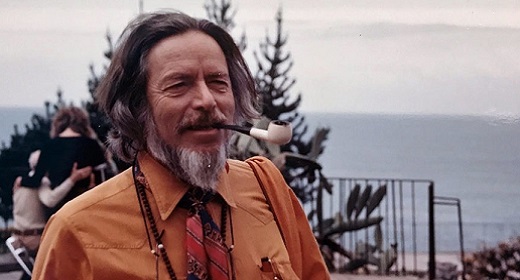Awaken: it might sound sentimental, but meeting you and having this time with you, is a crowning moment for me.
As I share in my own book… it was because of you and my accidental stumbling upon The Wisdom of Insecurity, that I ended up pursuing a career in eastern philosophy. So, to say “thank you and welcome” just doesn’t seem enough. May we start by diving right in? What does it mean to awaken?
Alan Watts: There is no really satisfactory name for this type of experience. To call it “mystical” is to confuse it with visions of another world, or of gods and angels. To call it spiritual or metaphysical is to suggest that it is not also extremely concrete and physical, while the term “cosmic consciousness“ itself, has the unpoetic flavor of occultist jargon. But from all historical times and cultures we have reports of this same unmistakable sensation emerging, as a rule, quite suddenly and unexpectedly and from no clearly understood cause.
To the individual thus enlightened, it appears as a vivid and overwhelming certainty that the universe, precisely as it is at this moment, as a whole and in every one of its parts, is so completely right as to need no explanation or justification beyond what it simply is.
Existence not only ceases to be a problem; the mind is so wonder-struck at the self-evident and self-sufficient fitness of things as they are, including what would ordinarily be thought the very worst, that it cannot find any word strong enough to express the perfection and beauty of the experience. Its clarity sometimes gives the sensation that the world has become transparent or luminous, and that it is ordered by a supreme intelligence. At the same time, it is usual for the individual to feel that the whole world has become his own body, and that whatever he is, has not only become, but always has been, what everything else is.
Awaken: So, it is as if a person loses his/her ordinary ego identity and limited sense of self?
Alan Watts: It is not that he loses his identity to the point of feeling that he actually looks out through all other eyes, becoming literally omniscient, but rather, that his individual consciousness and existence is a point of view temporally adopted by something immeasurably greater than himself.
Awaken: Would you say that the essence of the experience has to do with getting out of our heads, and the world of “ideas,” and instead, dropping into the vividness of our senses?
Alan Watts: The central core of the experience seems to be the conviction, or insight, that the immediate now, whatever its nature, is the goal and fulfillment of all living. Surrounding and flowing from this insight is an emotional ecstasy, a sense of intense relief, freedom, and lightness, and often of almost unbearable love for the world…
Awaken: I feel like I’ve had moments of this sort of ecstasy, but it is fleeting, and then I fall into the trap that all the masters warn us about… “chasing the dragon,” so to speak… trying to get the experience back again, and then it just becomes another attachment!
Alan Watts: Often, the pleasure of the experience is confused with the experience and the insight is lost in the ecstasy, so that in trying to retain the secondary effects of the experience, the individual misses its point—that the immediate now is complete even when it is not ecstatic. For ecstasy is necessarily in permanent contrast to the constant fluctuation of our feelings. But insight, when clear enough, persists; having once understood a particular skill, the facility tends to remain.
Awaken: I recently spoke with an old friend of yours, Ram Dass, and he shared his own experience of awakening. He said that while breaking us out of our sense of separateness, it also brings a feeling of clarity… I’ll share that passage:
These moments bring a sense of rightness, of total perfection, of being at-one-ment, of clarity, feeling intimately involved with everything around you, of being free of the tension that self-conscious thought brings. ~Ram Dass
Alan Watts: But clarity may also suggest transparency, or the sense that the world confronting us is no longer an obstacle and the body no longer a burden, and to a Buddhist, this will just as naturally call to mind the doctrine of reality as the ungraspable, indefinable Void (sunyatta).
Clarity–the disappearance of problems–suggests light, and in the moments of such acute clarity, there may be the physical sensation of light penetrating everything. To a theist, this will naturally seem to be a glimpse of the presence of God.
Awaken: Ahh, yes, we tend to interpret our experiences based on our language and cultural associations. But there seems to be something else that is common to these experiences of awakening, and that is the feeling of being at one with the universe…
Alan Watts: One will get the sense that his ego or self has expanded to become the entire universe, whereas another will feel that he has lost himself altogether, and that what he called his ego was never anything but an abstraction… One declares himself convinced that there is no death, his true self being as eternal as the universe. Another states that death has simply ceased to matter, because the present moment is so complete that it requires no future. One feels himself taken up and united with a life infinitely other than his own. But as the beating of the heart may be regarded as something that happens to you or something that you do, depending on the point of view, so another will feel that he has experienced, not a transcendent God, but his own inmost nature. One will describe himself as infinitely enriched, while another will speak of being brought to such absolute poverty that he owns not even his mind and body, and has not a care in the world.
Awaken: This type of experience, like all experiences, can be quite subjective, even in seeming contradiction to someone else’s experience. Or at least, in so far as it is described…
Alan Watts: One and the same pain may be described either as a hot pain or as a cold sting, so the descriptions of this experience may take forms that seem to be completely opposed. One person may say that he has found the answer to the whole mystery of life, but somehow cannot put it into words. Another will say that there never was a mystery and there’s no answer to it, for what the experience made clear to him was the irrelevance and artificiality of all our questions.
Awaken: Could you share one of your own awakening experiences with us?
Alan Watts: Shortly after I had first began to study Indian and Chinese philosophy, I was sitting one night by the fire, trying to make out what was the right attitude of mind for meditation as it is practiced in Hindu and Buddhist disciplines. It seemed to me that several attitudes were possible, but as they appeared mutually exclusive and contradictory, I was trying to fit them into one–all to no purpose. Finally, in sheer disgust, I decided to reject them all and have no special attitude of mind whatsoever. In the force of throwing them away it seemed that I threw myself away as well, for quite suddenly the weight of my own body disappeared. I felt that I owned nothing, not even a self, and that nothing owned me. The whole world became as transparent and unobstructed as my own mind; the “problem of life” simply ceased to exist, and for about eighty hours, “I” and everything around me felt like the wind blowing leaves across a field on an autumn day.
The second time, a few years later, came after a period when I had been attempting to practice what Buddhists call “recollection” (smriti) or constant awareness of the immediate present, as distinct from the usual distracted rumbling of reminiscence and anticipation. But, in discussing it one evening, someone said to me, “But why try to live in the present? Surely we are always completely in the present even when we’re thinking about the past or the future?”This, actually quite obvious remark again brought on the sudden sensation of having no weight.
At the same time, the present seemed to become a kind of moving stillness, an eternal stream from which neither I nor anything could deviate. I saw that everything, just as it is now, is IT. I saw that when the Upanishads said, “That art thou!” Or, “All this world is Brahman,” they meant just exactly what they said. Each thing, each event, each experience, and its inescapable nowness, in all its own particular individuality, was precisely what it should be, and so much so that it required a divine authority and originality.
It struck me with the fullest clarity that none of this depended on my seeing it to be so; that was the way things were, whether I understood it or not, and if I did not understand, that was IT too.
Furthermore, I felt that I now understood what Christianity might mean by the love of God—namely, that despite the commonsensical imperfection of things, they were nonetheless loved by God just as they are, and that this loving of them was at the same time the godding of them. This time the vivid sensation of lightness and clarity lasted a full week.
Awaken: A week is a long time for the lingering of such sensations, but some might wonder what the point is, if it doesn’t translate into something that endures…
Alan Watts: I have come to realize that how I feel, whether the actual sensation of freedom and clarity is present or not, is not the point–for, again, to feel heavy or restricted is also IT.
Awaken: Yes, all the changing nuances of our emotional states are part of life, just as all the phases of the moon are part of the whole cosmic cycle. Which brings up this questionable notion of spiritual practice as self improvement… the idea that to be spiritual is to somehow become “perfect,” whatever that means, or at least problem-free.
Alan Watts: People appear to be under the fixed impression that one speaks or writes of these things in order to improve them or do them some good… assuming, too, that the speaker has himself been improved and is able to speak with authority. In other words, the philosopher is forced into the role of preacher, and is in turn expected to practice what he preaches.
Thereupon the truth of what he says is tested by his character and his morals—whether he shows anxiety or not, whether he depends upon “material crutches“ such as wine or tobacco, whether he has stomach ulcers or likes money, whether he loses his temper, or gets depressed, or falls in love when he shouldn’t, or sometimes looks a bit tired and frayed at the edges. All these criteria might be valid if the philosopher were preaching freedom from being human, or if he were trying to make himself and others radically better.
Awaken: Yes, to be human is to live with continuous challenges, like waves in the ocean. It seems absurd to think that the purpose of life were to somehow stop the waves.
Alan Watts: In the span of one lifetime it is, of course, possible for almost every human being to improve himself —within limits set by energy, time, temperament, and the level from which he begins. Obviously, then, there is a proper place for preachers and other technical advisors in the disciplines of human betterment. But the limits within which such improvements may be made are small in comparison with the best aspects of our nature and our circumstances which remain the same, and which will be very difficult to improve… I am saying, therefore, that while there is a place for bettering oneself and others, solving problems and coping with the situation is by no means the only, or even the chief business of life.
Awaken: Forgive me for being so bold, but I know you have personally received criticism for shall we say, “being human!”…
Alan Watts: Some people… expect me to be their guru or messiah or exemplar, and are extremely disconcerted when they discover my “wayward spirit” or element of irreducible rascality, and say to their friends, “How could he possibly be a genuine mystic and be so addicted to nicotine and alcohol?” Or have occasional shudders of anxiety? Or be sexually interested in women? Or lack enthusiasm for physical exercise? Or have any need for money?
Such people have in mind an idealized vision of the mystic as a person wholly free from fear and attachment, who sees within and without, and on all sides, only the translucent forms of a single divine energy which is everlasting love and delight… from which he effortlessly radiates peace, love, and joy. What an enviable situation!
We too, would like to be one of those, but as we start to meditate and look into ourselves, we find mostly a quaking and palpitating mess of anxiety which lusts and loathes, needs love and attention, and lives in terror of death putting an end to its misery. So we despise that mess, and look for ways of controlling it and putting “how the true mystic feels” in its place, not realizing that this ambition is simply one of the lusts of the quaking mess, and that this, in turn, is a natural form of the universe, like rain and frost, slugs and snails, flies and disease.
Awaken: We are contradictory creatures indeed, and yet, notwithstanding the quality of rascality—a quality I share!—we are still in love with mysticism and truly long to be close to the divine…
Alan Watts: It is thus that by grace or nature (take your choice) I am a mystic in spite of myself, remaining as much of an irreducible rascal as I am, as a standing example of God’s continuing compassion for sinners or, if you will, of Buddhanature in a dog, or of light shining in darkness. Come to think of it, in what else could it shine?
Awaken: To play with this idea of self improvement just a bit more… I suppose, philosophically, the idea of “betterment” presupposes that there is indeed, some implied purpose to life, which is questionable to begin with, isn’t it? Even if there was a purpose, why assume it to be the same for everyone, and who would decide what our purpose should be?
Alan Watts: Human purposes are pursued within an immense circle and universe, which does not seem to me to have purpose, in our sense, at all. Nature is much more playful than purposeful, and the probability that it has no special goals for the future need not strike one as a defect. On the contrary, the processes of nature as we see them both in the surrounding world and in the involuntary aspects of our own organisms are much more like art than like business, politics, or religion. They are especially like the arts of music and dancing, which unfold themselves without aiming at future destinations. No one imagines that a symphony is supposed to improve in quality as it goes along, or that the whole objective in playing it is to reach the finale.
The point of music is discovered in every moment of playing and listening to it. It is the same, I feel, with the greater part of our lives, and if we are unduly absorbed in improving them, we may forget altogether to live them. The musician whose chief concern is to make every performance better than the last may so fail to participate and delight in his own music, that he will impress his audience only with the anxious rigor of his technique.
Awaken: So then, if not for self improvement, how does the mystical or cosmic experience that we spoke of, serve us?
Alan Watts: “Cosmic“ consciousness is a release from self-consciousness, that is to say from the fixed belief and feeling that one’s organism is an absolute and separate thing, as distinct from a convenient unit of perception. For if it becomes clear that our use of the lines and surfaces of nature to divide the world into units is only a matter of convenience, then all that I have called myself is actually inseparable from everything.
This is exactly what one experiences in these extraordinary moments. It is not that the outlines and shapes which we call “things” and use to delineate things disappear into some sort of luminous void. It simply becomes obvious that though they may be used as divisions, they do not really divide. However much I may be impressed by the difference between a star and the dark space around it, I must not forget that I can see the two only in relation to each other, and that this relation is inseparable.
The most astonishing feature of this experience is, however, the conviction that this entire unspeakable world is “right,“ so right that our normal anxieties become ludicrous, but if only men could see it they would go wild with joy…for the experience makes it perfectly clear that the whole universe is through and through the playing of love in every shade of the word’s use, from animal lust to divine charity.
Awaken: What is your opinion on the use of psychedelics as a portal into this kind of cosmic experience?
Alan Watts: In some, I would say that LSD, and such other psychedelic substances as mescaline, psilocybin, and hashish, confer polar vision; by which I mean that the basic pairs of opposites, the positive and the negative, are seen as the different poles of a single magnet or circuit. This knowledge is repressed in any culture that accentuates the positive and is thus a strict taboo… The implication of this may be that there is nothing in life to be gained or attained that is not already here and now, an implication thoroughly disturbing to any philosophy or culture which is seriously playing the game which I have called White Must Win.
Awaken: Interesting that the use of psychedelics surged around the same time as the hippie movement, along with heightened interest in things like transcendental meditation and Yoga…
Alan Watts: I can see now that LSD and other psychedelic substances simply triggered an explosion of interest in the mystical aspect of religion that was building up… through increasing contact with oriental cultures, and because of the arid theology and whipping-dead-horse preaching of standard-brand Judaism and Christianity.
Awaken: What did you think of Timothy Leary and Richard Albert’s (Ram Dass’) LSD experiments in the academic realm?
Alan Watts: I was present at the dinner party where Timothy finally agreed with David McClelland to withdraw experimentation with drugs from his work under the department. David was making the point that they had become too enthusiastic about their work to preserve scientific integrity and with this I was in partial agreement, because to be intellectually honest you must be able to come to terms with any intelligible criticism of your ideas. When I have received inspirations during an LSD session, I have always reviewed them subsequently in the light of cold sobriety, in which some, but by no means all, of them appear to be nonsense…
What followed is now a matter of history. Timothy and Richard continued their experiments unofficially, and scandalized the university authorities by including undergraduates in their work… nevertheless, I myself began to be concerned, if mildly, at the direction of Timothy‘s enthusiasm, for to his own circle of friends and students he had become a charismatic religious leader who, well trained as he was in psychology, knew very little about religion and mysticism and their pitfalls.
The uninstructed adventure with psychedelics, as with Zen or yoga or any other mystical discipline, is an easy victim of what Jung calls “inflation,“ of the messianic megalomania that comes from misunderstanding the experience of union with God. It leads to the initial mistake of casting pearls before swine, and, as time went on, I was dismayed to see Timothy converting himself into a popular storefront Messiah with his name in lights, advocating psychedelic experience as a new world-religion.
Awaken: You mentioned that although your own LSD experiences may have appeared differently in the cold light of day, you did have some “inspirations!” I’d love to hear more about that.
Alan Watts: My first experience was aesthetic rather than mystical… and then… it brought me into an undeniably mystical state of consciousness. But oddly, considering my absorption in Zen at the time, the flavor of these experiences was Hindu rather than Chinese.
My retrospective attitude to LSD is that when one has received the message, one hangs up the phone. I think I have learned from it as much as I can, and, for my own sake, would not be sorry if I could never use it again. But it is not, I believe, generally known that very many of those who had constructive experiences with LSD, or other psychedelics, have turned from drugs to spiritual disciplines—abandoning their water-wings and learning to swim. Without the catalytic experience of the drug they might never have come to this point, and thus my feeling about psychedelic chemicals, as about most other drugs (despite the vague sense of the word), is that they should serve as medicine rather than diet.
Awaken: You were raised in the Christian tradition, but are known in the west for your work around the eastern spiritual teachings. Do you now affiliate yourself with any particular religion?
Alan Watts: Speaking as of today, I do not consider it intellectually respectable to be a partisan in matters of religion. I see religion as I see such other basic fascinations as art and science, in which there is room for many different approaches, styles, techniques, and opinions. I am not formally a committed member of any creed or sect and hold no particular religious view or doctrine as absolute.
I deplore missionary zeal, and consider exclusive dedication to and advocacy of any particular religion, as either the best or the only true way, an almost irreligious arrogance. Yet my work and my life are fully concerned with religion, and the mystery of being is my supreme fascination, though, as a shameless mystic, I am more interested in religion as feeling and experience than as conception and theory.
Awaken: Yes, experiences such as those that we have discussed so beautifully this hour… but, if we may take a step back for a moment… Tell me, how did you break, literally but also mentally, from the Christian tradition that you grew up with?
Alan Watts: After a few years of experiment with prayer, of trying quite earnestly to get into a Christian frame of mind under the dangerous assumption that it might be good for me, I went back to meditation–especially walking meditation, which I have always preferred to long periods of sitting.
For one reason, when walking there is no need for others to know that you are meditating and just feel guilty or embarrassed for not doing likewise. For another, the self-consciousness of sitting in a special way, of having a special time or place for the practice, does not intrude itself. That I could go out for a walk, under the pretext of taking the air, or pace the floor, seeming to be thinking out a book or a sermon, and yet be absorbed in mystical silence of the mind.
And, oddly enough, at the time, it didn’t really occur to me that I was practicing meditation, so that I have always considered myself rather lazy and haphazard in respect of this discipline. I didn’t think of myself as doing an exercise, but simply as exploring a state of consciousness out of sheer interest. A Christian writer has said that the monk prays best who does not know that he is praying.
It was only natural then, that I began—in a roundabout way—to speak about meditation to the students in my congregation and to the seminarists from next door who, sensing that I had an odd and interesting attitude to religion, used to come over to talk shop with me. This, in effect, made me an unofficial and subversive member of the theological faculty.
At this time I discovered an extraordinary little book by a seventeenth-century Jesuit, J. P. de Caussade’s Abandonment of the Divine Providence, in which he insisted that the presence of the moment—the eternal now—should be regarded as the presence of God.
If we knew how to greet each moment as the manifestation of the divine wheel, we would find in it all the heart could desire… The present moment is always filled with infinite treasures: it contains more than you are capable of receiving… The divine will is an abyss, of which the present moment is the entrance; plunge fearlessly there in and you will find it more boundless than your desire. ~J.P. Caussade
Awaken: It sounds very much like Buddhist teachings!
Alan Watts: This was exactly what I had discovered in Buddhist meditation years before… but now I had the authority of a most orthodox Catholic for saying it out loud, and making excellent sense of the place in the Sermon on the Mount where Jesus speaks of taking no thought for the morrow, “no thought“ being the literal equivalent of wu-nien in Zen Buddhism, and of what I have called mystical silence, in which one is simply aware of what is, here and now, without verbal or ideational comment.
Awaken: Well, you and I have that in common. The one book that changed our lives… For me, as I have mentioned, it was your book, The Wisdom of Insecurity, with its message of how the ways of technology and modern life are conducive to an anxious existence, that altered the course of my life and career. You wrote that book in 1951, and yet, I found it to be way ahead of its time, even when it landed in my hands in the late 80’s. And I believe its message still holds, perhaps even more so, now. Could you speak to this point?
Alan Watts: The miracles of technology cause us to live in a hectic, clockwork world that does violence to human biology, enabling us to do nothing but pursue the future faster and faster. Deliberate thought finds itself unable to control the upsurge of the beast in man—a beast more “beastly“ than any creature of the wild, maddened and exasperated by the pursuit of illusions. Specialization in verbiage, classification, and mechanized thinking has put men out of touch with many of the marvelous powers of “instinct“ which govern his body.
It has, furthermore, made him feel utterly separate from the universe. And thus, when all philosophy has dissolved in relativism, and can make fixed sense of the universe no longer, isolated “I“ feels miserably insecure and panicky, finding the real world a flat contradiction of its whole being.
Of course, there is nothing new in this predicament of discovering that ideas and words cannot plumb the ultimate mystery of life, that reality or, if you will, God… The only novelty is that the predicament is now social rather than individual; it is widely felt, not confined to the few.
Awaken: What is the solution?
Alan Watts: Two things must happen: Man must surrender his separate-feeling “I,” and must face the fact that he cannot know, that is, define the ultimate… there lies a “vision of God“ which cannot be put into words, and which is certainly something utterly different from perceiving a radiant gentleman on a golden throne, or a literal flash of blinding light.
This vision is, then, the unclouded awareness of this indefinable “something” which we call life, present reality, the great stream, the eternal now—an awareness without the sense of separation from it. The moment I name it, it is no longer God… it is man, tree, green, black, red, soft, hard, long, short, atom, universe. One would readily agree with any theologian who deplores pantheism that these denizens of the world of verbiage and convention, these sundry “things” conceived as fixed and distinct entities, are not God.
If you ask me to show you God, I will point to the sun, or a tree, or a worm. But if you say, “You mean, then, that God is the sun, the tree, the worm, and all other things?”—I still have to say that you have missed the point entirely.
Awaken: Those are beautiful words to end with. To thank you for your time doesn’t seem enough. Spending this hour or so with you has been a treasure and a gift to me personally, and I am delighted to share our conversation with our awakened readers. Thank you, Alan, with all my heart.
This is one of Awaken’s Dream Interviews, conducted by Donna Quesada, and All Answers are Verbatim from Allan Watts.















































